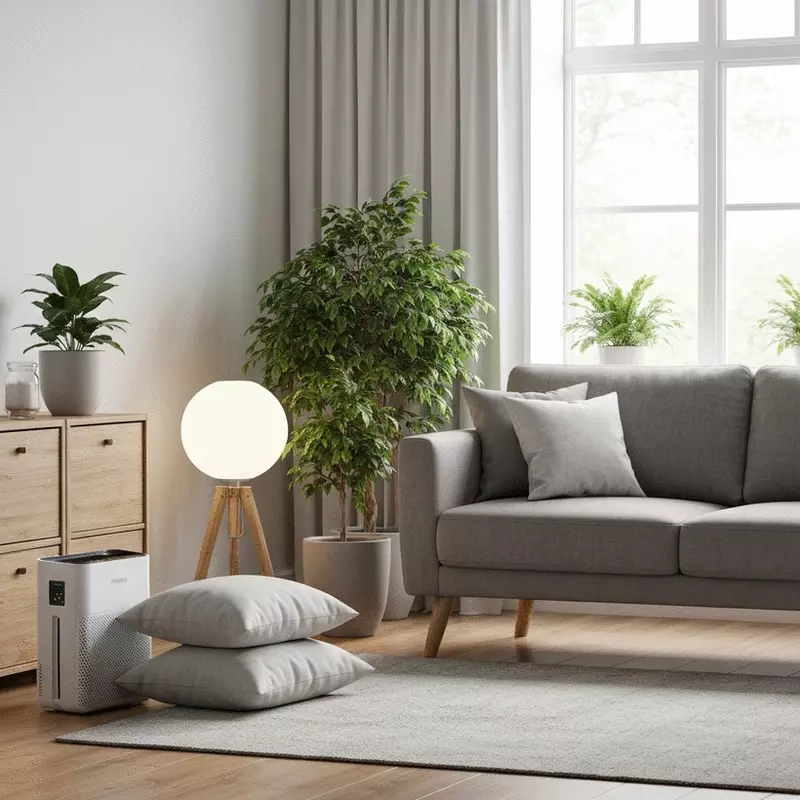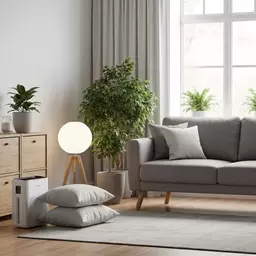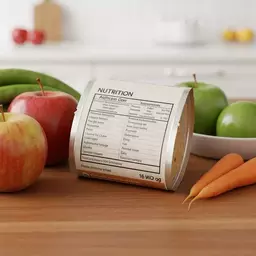HEPA Filters and Allergy Relief
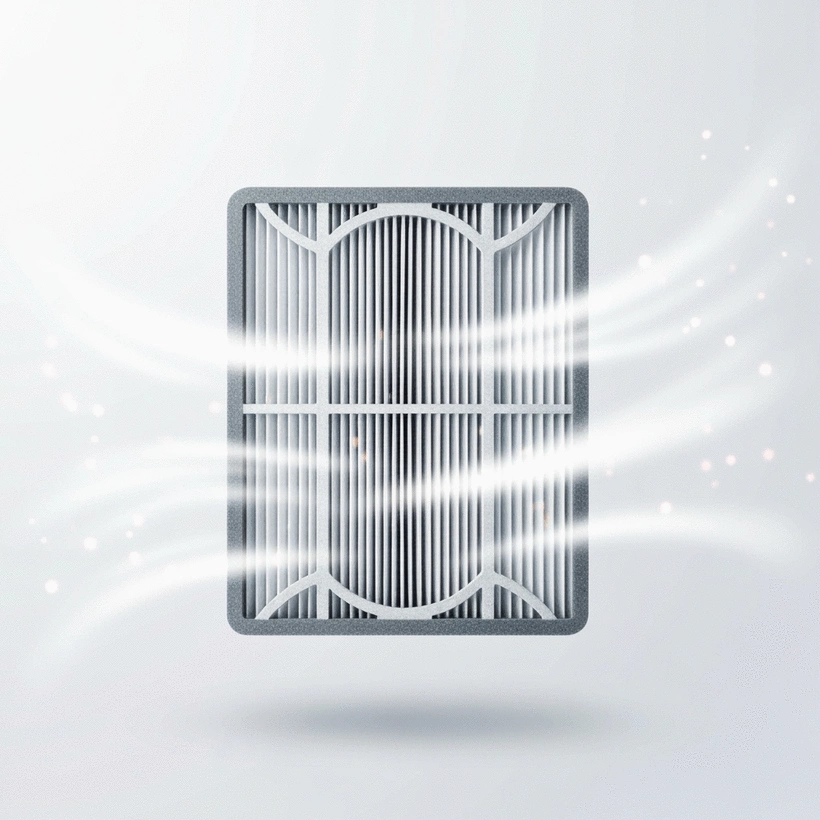
Have you considered how the air quality in your home affects your health? It’s more crucial than ever to understand the role that HEPA filters play in creating a healthier living environment, especially for those of us who struggle with allergies.
What You Will Learn
- HEPA filters can capture up to 99.97% of airborne allergens, making them essential for allergy management.
- Using HEPA filters leads to significant reductions in symptoms of allergic rhinitis, such as sneezing and nasal congestion.
- Regular maintenance and timely replacement of HEPA filters (every 6 to 12 months) ensure optimal air quality.
- HEPA filters should be part of a comprehensive strategy that includes understanding specific allergens and maintaining a clean environment.
HEPA Filter Efficacy & Benefits
HEPA filters are highly effective in capturing allergens and improving indoor air quality, offering significant health benefits for allergy and asthma sufferers. This visual highlights their particle capture efficiency and key advantages.
Particle Capture Efficiency
Particles as small as 0.3 microns, including dust, pollen, and pet dander.
Key Allergen Removal
- ✓ Pollen
- ✓ Dust Mites & Waste
- ✓ Pet Dander
- ✓ Mold Spores
Providing a cleaner, more breathable environment.
Health Benefits
- ✓ Reduces Allergic Rhinitis
- ✓ Improves Respiratory Health
- ✓ Manages Asthma Triggers
- ✓ Enhances Quality of Life
Scientific studies support their effectiveness.
Maintenance & Value
- ★ Replace every 6-12 months
- ★ Reduces medical expenses
- ★ Improves productivity
- ★ Long-term health investment
Ensuring continuous air quality benefits.
The Role of HEPA Filters in Enhancing Indoor Air Quality
As someone passionate about allergy awareness, I can’t stress enough how crucial good air quality is for individuals like us. HEPA filters play a significant role in improving indoor air quality, which is vital for managing allergies and asthma. They efficiently remove common allergens, helping us breathe easier and live more comfortably!
In this section, we will dive into the technology behind HEPA filters, explore their health benefits, and provide practical advice for choosing the right air purifiers. By understanding these filters, we can make informed choices that enhance our living spaces and support our health.
Understanding HEPA Filter Technology
What Are HEPA Filters and How Do They Work?
HEPA stands for High-Efficiency Particulate Air. These filters are designed to trap a vast majority of particles as small as 0.3 microns, which includes dust, pollen, and pet dander. But how do they do this? The technology employs a dense network of fibers that create a maze for particles. As air flows through, pollutants get caught in these fibers, effectively cleaning the air we breathe.
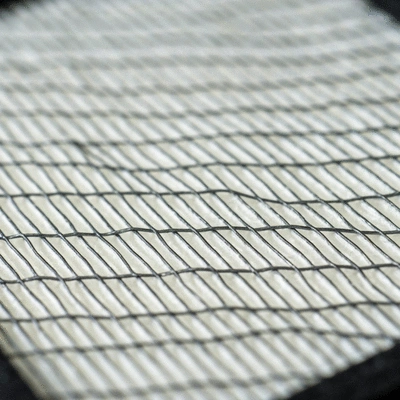
In short, HEPA filters are essential for anyone looking to reduce allergens in their home. They can be used in various appliances, from air purifiers to vacuum cleaners. Investing in a HEPA filter is a step towards a healthier home environment!
Particle Capture Efficiency: How HEPA Filters Remove Allergens
The efficiency of HEPA filters is remarkable. They can capture up to 99.97% of particles, making them an excellent choice for allergy sufferers. Here are some of the key allergens that HEPA filters effectively remove:
- Pollen from trees, grasses, and weeds
- Dust mites and their waste
- Pet dander from cats, dogs, and other animals
- Mold spores
By filtering out these allergens, HEPA filters provide a cleaner and more breathable environment, which is particularly important for individuals like us who struggle with allergies on a daily basis.
Health Benefits of Using HEPA Filters for Allergy Relief
Impact on Allergic Rhinitis and Respiratory Health
Using HEPA filters can significantly reduce symptoms associated with allergic rhinitis, such as sneezing, nasal congestion, and itchy eyes. When these allergens are eliminated from our indoor air, it leads to a decrease in these frustrating symptoms! I’ve personally noticed a difference in my own allergies when using air purifiers equipped with HEPA technology, as supported by research on air cleaners and filters for the home from the EPA.
In addition to allergy relief, clean air contributes to better overall respiratory health. It can minimize the risk of asthma attacks and other respiratory issues, providing an essential layer of protection for those of us with compromised respiratory systems.
Scientific Studies Supporting HEPA Effectiveness in Allergen Reduction
Numerous studies highlight the effectiveness of HEPA filters in reducing indoor allergens. For instance, a study published in the Journal of Allergy and Clinical Immunology showed that households using HEPA filters experienced significant reductions in airborne allergens. Further research, such as an article on the efficacy of HEPA filters in improving indoor air quality, consistently demonstrates their positive impact on reducing allergen exposure. Another study on air purifiers for allergic rhinitis further supports the significant reduction in symptoms.
These studies not only provide evidence of HEPA filter efficacy but also reinforce their importance in managing allergies and improving air quality. It’s comforting to have scientific backing for the choices we make regarding our health!
How HEPA Filters Help Manage Asthma and Allergic Reactions
For those of us living with asthma, HEPA filters can be a game-changer. They help reduce triggers that can lead to asthma attacks. By maintaining cleaner indoor air, we can lower the chances of experiencing allergic reactions, which can be crucial for our well-being.
Moreover, breathing cleaner air can enhance our quality of life. Being able to navigate our homes without the fear of allergens lurking around is a significant relief! By prioritizing air quality, we are taking direct action to support our health.
Pro Tip
Did you know? Regularly maintaining your HEPA filters is crucial for optimal performance. To prolong their lifespan and ensure effective allergen capture, check and replace your filters every 6 to 12 months, and consider using a vacuum cleaner with a HEPA filter for added protection against dust and dander!
Summarizing the Significance of HEPA Filters for Allergy Sufferers
As someone who has navigated the challenges of allergies, I can’t emphasize enough the importance of HEPA filters in creating a healthier living environment. These filters play a vital role in improving indoor air quality, which can significantly benefit those of us with allergies. Understanding their cost-effectiveness and maintenance needs is essential for making informed decisions about our home air purifiers.
Addressing Cost-Effectiveness and Maintenance Needs
Investing in a quality HEPA filter isn’t just about the initial cost; it’s also about evaluating its long-term value. While some filters may seem expensive upfront, the relief they provide from allergens can be life-changing. Over time, the reduction in allergy symptoms can save you from frequent doctor visits and costly medications.
Evaluating the Long-Term Value of HEPA Filters
- Reduce allergy-related health issues
- Potential savings on medical expenses
- Improved quality of life and productivity
Many people often overlook how the right HEPA filter can contribute to their overall well-being. A small investment can lead to substantial health benefits over time, making it a wise choice for allergy sufferers.
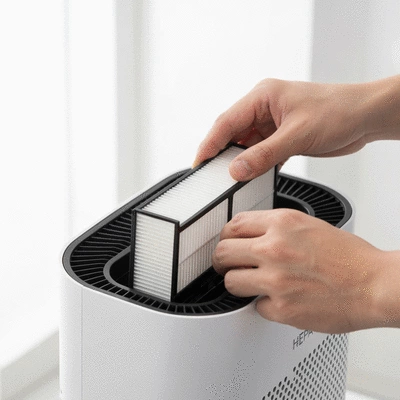
Frequency of Maintenance: How to Prolong Filter Lifespan
To get the most out of your HEPA filter, regular maintenance is key. This means checking and replacing your filters as recommended by the manufacturer. Most filters need to be replaced every 6 to 12 months, depending on use and environmental factors. Keeping track of this can ensure your air quality remains high.
Understanding Limitations and Potential Misuses of HEPA Purifiers
While HEPA filters are incredibly effective, it’s crucial to understand their limitations. For example, they cannot eliminate all types of indoor pollutants. Being aware of some common misconceptions surrounding HEPA filters can help us use them more effectively in our homes.
Common Misconceptions About HEPA Filters and Ozone Generation
- HEPA filters do not produce ozone
- They cannot filter out gases or odors
- Not all air purifiers are created equal
It’s essential to choose air purifiers that do not emit ozone, as this can be detrimental, especially for those with respiratory issues. When selecting a product, always check the specifications and ratings to avoid any misinformation.
When HEPA Filters Alone Are Not Enough for Allergy Relief
HEPA filters are excellent at capturing many allergens, but they should not be relied upon solely for allergy management. Integrating them into a broader strategy is crucial for achieving maximum relief from symptoms. Understanding your specific allergens is a vital step in addressing your needs effectively.
Recognizing the Impact of Indoor Pollutants Beyond HEPA Filters
Indoor pollutants can vary widely, and while HEPA filters help a great deal, they won’t capture everything. For example, volatile organic compounds (VOCs) from paints or cleaning products are not effectively filtered. Regularly ventilating your home and minimizing the use of harmful products is just as important!
FAQs About HEPA Filters and Allergy Relief
- What does HEPA stand for?
- HEPA stands for High-Efficiency Particulate Air. These filters are designed to capture a high percentage of airborne particles.
- How effective are HEPA filters at removing allergens?
- HEPA filters are highly effective, capable of capturing up to 99.97% of particles as small as 0.3 microns, including common allergens like dust, pollen, pet dander, and mold spores.
- Do HEPA filters help with allergic rhinitis and asthma?
- Yes, using HEPA filters can significantly reduce symptoms of allergic rhinitis (such as sneezing and nasal congestion) and help manage asthma by reducing airborne triggers.
- How often should I replace my HEPA filter?
- Most HEPA filters should be replaced every 6 to 12 months, depending on usage and environmental conditions, to ensure optimal performance.
- Can HEPA filters remove all types of indoor pollutants?
- While highly effective for particulate matter, HEPA filters do not remove all types of indoor pollutants. They are not designed to filter out gases, odors, or volatile organic compounds (VOCs).
- Do HEPA filters produce ozone?
- No, true HEPA filters do not produce ozone. It is important to choose air purifiers that are specifically certified not to emit ozone, as ozone can be harmful to respiratory health.
Call to Action: Making Informed Choices for Better Indoor Air Quality
Now that we’ve explored the significance of HEPA filters, it’s time to take action! Making informed choices about your indoor air quality can lead to a healthier lifestyle, especially for those of us with allergies.
Exploring the Best HEPA Filter Brands for Your Needs
There are many HEPA filter brands available, each with unique features. When selecting a brand, consider factors like filter efficiency, noise levels, and user reviews to find the one that fits your lifestyle best.
Encouraging Comprehensive Allergy Management Strategies
- Combine HEPA filters with other air quality measures
- Maintain a clean and clutter-free environment
- Stay informed about allergens in your area
By integrating various strategies, you can create a robust allergy management plan that truly enhances your quality of life.
How Home Air Quality Tests Can Inform Your Choices
Have you considered performing a home air quality test? This can provide valuable insights into the specific pollutants in your space. With this knowledge, you can select the most effective HEPA filter and additional strategies to better your home environment. Remember, knowledge is power when it comes to managing allergies!
Recap of Key Points
Here is a quick recap of the important points discussed in the article:
- HEPA filters capture up to 99.97% of allergens, improving indoor air quality.
- Regular maintenance, including timely replacement of filters, is vital for optimal performance.
- HEPA filters can significantly alleviate symptoms of allergic rhinitis and asthma.
- Understanding the limitations of HEPA filters is crucial; they do not eliminate all indoor pollutants.
- Combining HEPA filters with other air quality measures enhances overall effectiveness in allergy management.



